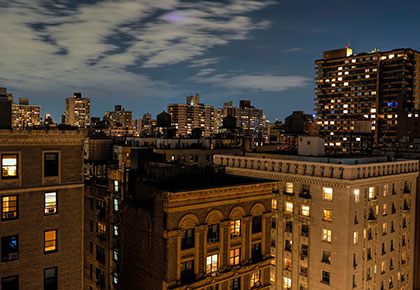-
Best practices to improve HOA financial stability
There’s a lot to love about living in a community with a homeowners association (HOA). The amenities. The sense of belonging. The high aesthetic standards. But none of that happens without stable finances. With that in mind, here’s the bottom line on financial best practices for your HOA. -
Four ways to fund an HOA capital improvement project
Living in a residential community means around-the-clock routine maintenance to preserve the community and its assets. But there comes a time when one of your assets will reach the end of its useful life and require a replacement or significant repairs. -

Enhancing energy benchmarking in condos and co-ops
Condominiums (condos) and cooperative housing communities (co-ops) are increasingly recognizing the importance of sustainability and energy efficiency in today's world. One vital tool that plays a crucial role in this effort is energy benchmarking. -
How the Consumers Price Index (CPI) can impact your HOA
If your community is professionally managed, consult your property management company for more information – a quality firm can leverage its budgeting and financial experience to provide guidance. But to get you started, we’ve compiled some information about the Consumer Price Index – what it is and what you need to consider before you get started. -
Raising a family in a high-rise: Understanding benefits and more
When a lot of people think about high-rise living, they don’t necessarily jump to the idea of families in high-rises. In many cities, high-rises are still considered the domain of the young and single, or couples without kids or active retirees. The New York Times even ran a piece, in 1987, decreeing that “A High-Rise Is Not a Home for Children.” But today, thanks to a Millennial generation that doesn’t want to commute from the ‘burbs, more and more high-rises are actively courting families as residents. -
How to choose the right HOA banking program
Board members have a fiduciary duty to protect the financial interests of both their homeowners association and fellow residents – and that includes ensuring that their HOA’s operating and reserve funds are properly managed, invested and protected. -
5 steps to create a lifestyle program using community amenities
Now more than ever, communities are searching for ways to increase resident engagement and create a social atmosphere. One way managers capitalize on their available community amenities is through lifestyle programming. -
How to plan a successful HOA event
Want your events to bring residents closer? Everyone loves a well-planned event, and the residents in your community association are no exception. Follow these tips for creating memorable events in your community association. -
How to plan an effective association budget for your community
Preparing your association’s annual budget...it can be a source of stress, but more importantly, it’s a valuable opportunity to ensure the financial well-being of both your association and homeowners. Proper association management hinges on this financial tool for both short-term and long-term planning, so it’s important to follow some guidelines. -
Preventing Wildfires: How to protect your home from wildfires
Wildfires continue to be a constant and deadly threat across North America, and the risk intensifies with soaring annual temperatures, strong winds and severe drought conditions. -
Six summer energy conservation tips
Summer’s longer days mean more time to enjoy warm weather and sunshine, but they also mean higher energy bills. There is a bright side, however: by implementing an energy management program within your community, you can help keep costs down without sacrificing comfort. -
Three tips for buying in bulk savings
As consumers, we’re familiar with saving money by purchasing products like food and household goods in bulk. But, can this same savings model be applied to the purchases and operational costs of a homeowner association (HOA), condominium or community association? -

What is an HOA master insurance policy?
We know that in the same way we protect ourselves, our assets also carry this significance. That is why HOA master insurance policies are essential for your community, as this type of coverage can help you protect more than just your physical assets. -
Hurricanes plans and policies to reduce your association's risk
Hurricanes can bring tremendous physical destruction and financial ruin to a community association unless policies are put into place to prepare for the storms before they arrive, and to deal with the consequences afterwards. Every board whose association could possibly be impacted by a hurricane must have a hurricane preparedness policy to help maximize safety, minimize risk and ultimately, protect its operating budget too. And just as important as having a policy is communicating the policy to your residents. -
Incentives Aim to Green Up New York, Reduce Operating Costs for Building Owners
A recent study found that 75% of greenhouse gasses in New York City are generated by buildings, primarily multifamily residential buildings. As part of a city-wide effort to incentivize buildings to develop programs to curb emissions, FirstService Residential held its Third Annual Green Expo & Symposium on May 15 in New York. The event featured a panel of industry experts, including FirstService Residential President Dan Wurtzel, who described the benefits of participating in city programs, as well as the opportunities to save money, help the environment and enhance property values. -
HOA Pools: The basics of swimming pool insurance
Swimming pools are one of the most common, and most desirable, amenities in communities. Making sure to have proper community pool insurance coverage. -
HOA best practices for improving board effectiveness
Whether you are a board member who wants to ensure your board is doing everything it can to succeed or a resident who wants to get involved in the governing of your community, we have identified the best practices that can help you get the answers you need. -
Keeping HOA and Condo Common Areas Clean During the Coronavirus Pandemic
During these unprecedented times, residents are spending the majority of their time at home to prevent the spread of COVID-19 and protect themselves and their loved ones from infection. One of their primary contact points with the outside world is in your HOA or condo common areas, where they can be at risk of contact with lingering coronavirus or even spread existing virus to other areas of the property. Read on for a comprehensive list of places to clean and how to clean them. -
-
Fall tips for homeowners: Your comprehensive checklist
Whether your HOA is self-managed or professionally managed, getting started on your fall and winter prep will help keep your operations running smoothly as the seasons and temperatures change – and that will keep your residents happy as well. -

Capital improvements vs repairs and maintenance: What’s the difference?
Maintaining your buildings’ assets is not a one-size-fits-all proposition. The common areas require a broad range of routine maintenance and repairs to keep them looking good and operating smoothly. -
Three things to know about community maintenance
Whether your community is self-managed or professionally managed, maintenance is a big part of the day-to-day responsibilities. It’s a responsibility that can quickly become overwhelming, especially when you walk in on a Monday morning to a list of what went wrong over the weekend. -
Tips for community waste management in your association
With a growing focus on proper environmental stewardship, many associations are working toward implementing green initiatives. But getting there can be daunting. With so many programs and opportunities available for all of us to reduce, re-use and recycle, it’s hard to know where to begin. -
How to handle mold in your association
No one wants to find mold in their home or any association building. Unfortunately, mold is ubiquitous – it’s in the air and in the water, and when given the chance, it spreads like crazy. Learn steps to prevent mold or to have it assessed and properly treated, preserving your buildings and the health of your residents.